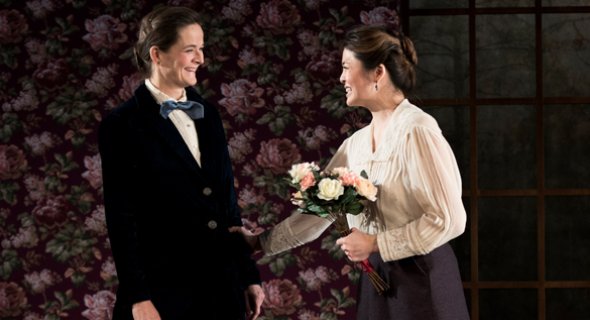
Bull in a China Shop by Bryna Turner, directed by Lee Sunday Evans at the Claire Tow Theater of Lincoln Center, New York.
The name of Mary Woolley has become obscured by the passage of time. A smart and literate play at Lincoln Center reminds us of her remarkable achievements.
Mary Emma Woolley, born in 1863, was the first female student to attend Brown University and served as president of Mount Holyoke College from 1900 to 1937. She revolutionized women’s education and won additional renown as a women’s suffrage supporter and peace activist. Before Mount Holyoke, Woolley taught biblical history and literature at Wellesley College. While there, she met Jeannette Marks, then a student, and the two women began a life partnership.
The relationship between the two is an important part of Bull in a China Shop, actually receiving more attention than educational matters. This element plays like a conventional love story, and tension drops off during their scenes in the middle part of the production, whereas the historical story of social and political issues is fascinating.
The tough-talking Woolley was quick to make progressive changes at her college and gained a reputation as a bull in a China shop. Interesting, isn’t it, that a male figure of speech had to be used to describe her. And it’s sad that “bull” can be a positive identification while the female equivalent, “cow,” is perceived as subservient.
Before Woolley’s arrival, Mount Holyoke educated its upper-class New England students for lives of service to society (i.e., to men) and Woolley advocated academic accomplishment. She abolished the school’s domestic work system which required cooking and cleaning.
In this play based on real life, Mary and Jeannette are a devoted couple, but Marks does have an affair with a student. This is an affront to Woolley because of their proximity on campus and the age difference. Instead of focusing on Wooley’s reaction, however, the play spotlights the near-hysterical adolescent outburst of the student.
A powerful scene has Marks speaking directly to the audience as if we are classroom students, displaying her passion and charisma. Both of the women have to cope with faculty resentments over Woolley’s favoritism toward Marks.
Some observers might conflate Woolley’s leadership role in education with a similar role in lesbian rights. But apparently this was not the case. It seems odd, but Woolley did not allow Marks to live with her for many years. She was so assertive on almost every issue, so why couldn’t she insist on Marks moving into her residence on campus?
Woolley was active in the American Civil Liberties Union and supported the National Association for the Advancement of Colored People, and U.S. entry into the League of Nations after World War I. But Marks was even more of a progressive leader of social movements, and she berates Woolley for waiting “until the right moment” to speak out for Women’s Suffrage.
The playwright modernizes the script by repeatedly using “fuck” as an epithet, and by casting Asian-Americans in prominent roles. It makes a good point: that Woolley’s issues are still relevant in our time. But some audience members may feel that it trivializes the story, and that the tale would emerge stronger if the time period and surrounding events were given more prominence.
Enid Graham was impressive as Woolley while Ruibo Qian was powerful as Marks. Michele Selene Ang presented a passionate and relatable Pearl, the student with a crush on her teacher. Lizbeth Mackay gave a dignified performance as the dean who represented old tradition at Mount Holyoke. Crystal Lucas-Perry effectively rounded out the cast.
As she balanced educational issues with women’s relationships, playwright Turner created an fascinating play. We’ll be watching for her future works with great interest.